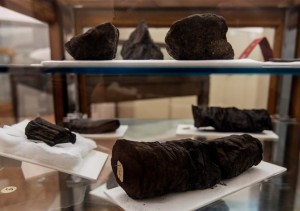
Gases and ash from Mount Vesuvius turned the Herculaneum scrolls into carbonized plant material.
Credit Salvatore Laporta/Associated Press
Researchers have found a key that may unlock the only library of classical antiquity to survive along with its documents, raising at least a possibility of recovering vanished works of ancient Greek and Roman authors such as the lost books of Livy’s history of Rome.
The library is that of a villa in Herculaneum, a town that was destroyed in A.D. 79 by the eruption of Mount Vesuvius that obliterated nearby Pompeii. Herculaneum, like Pompeii, was engulfed by mixtures of superhot gases and ash, which preserved the documents in a grand villa that probably belonged to the family of Lucius Calpurnius Piso Caesoninus, the father-in-law of Julius Caesar.
Though the hot gases did not burn the many papyrus rolls in the villa’s library, they turned them into cylinders […]











This is an exciting discovery! I think it is incredible and wonderful that previous scholars had the insight and unselfishness to preserve the scrolls without unrolling them, in the hopes that better methods would be invented.